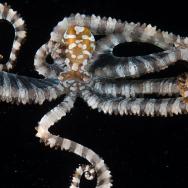Each cell comes with a finite set of instructions encoded in its DNA. Life, however, is unpredictable, and when circumstances change, animals need flexibility to acclimate.
New research led by Joshua Rosenthal of the Marine Biological Laboratory and Eli Eisenberg at Tel Aviv University indicates that octopuses and their close relatives elegantly adjust to environmental challenges by tinkering with their RNA — an intermediary molecule that conveys DNA’s directions.
In a new study appearing in Cell on June 8, Rosenthal and colleagues document an enormous uptick in RNA editing when octopus, squid and cuttlefish, known as coleoid cephalopods, acclimate to cold water. After cooling the octopuses’ tanks, the team saw increases in protein-altering activity at more than 13,000 RNA sites in the animals’ nervous systems. In two of these cases, they investigated how swapping out a single letter of the RNA molecule’s code alters the function of proteins the neurons produce.
Through RNA editing, the cephalopods appear to have found a unique way of tweaking their own physiology, according to Rosenthal, a senior scientist at MBL.
Mystery of massive RNA editing
A cell’s molecular machinery transcribes the instructions encoded in DNA into RNA, some of which goes on to make protein. Researchers have learned that cells have the capacity to swap one member of the four-letter genetic code, Adenosine, for a substitute molecule, Inosine, which behaves like Guanosine, one of the original four. While the same process occurs in humans and most other animals, it only rarely affects RNA that’s bound to produce protein.
In 2015, Rosenthal and his colleagues showed that squid employ this kind of protein-altering RNA editing (called A-to-I) on a massive scale, and later showed the same in octopus.
“A big question for us was, ‘What are they using it for?’” Rosenthal says.
Because editing changes RNA only temporarily, the researchers suspected these animals use it to acclimate to their environment. For the current study, they focused on the effects of one such factor, temperature, within the nervous system. Temperature matters because it governs the activity of enzymes, which in turn drive chemical reactions crucial to all physiological processes.
Like other cephalopods, the California two-spot octopus (Octopus bimaculoides) they studied cannot generate its own body heat to counteract the temperature drops that accompany tides, changes in water depth, and seasons.
After acclimating octopuses to temperatures at the warm end of their natural range (22 degrees C/ 72 degrees F) and the cool end (about 13 degrees C / 55 degrees F), the researchers examined their RNA. Within its molecular code, they tracked activity at locations where they already knew editing occurs. In the octopuses in the cold tanks, they found significant increases at 13,285 sites where the one-letter change alters protein. For those in the warm tanks, they found upticks at 550 such places.
Follow-up experiments suggested RNA editing may help the animals adapt to gradual changes, but not to rapid ones associated with, for example, traveling from warmer surface water down to cooler depths.
To corroborate the lab work, Matthew Birk, now an assistant professor at Saint Francis University in Pennsylvania, recorded temperature near octopus dens in winter and late summer, then collected the animals.
With help from collaborators at the University of Michigan and Texas Tech University, the team investigated how RNA editing tweaked the function of two proteins that are vital for neural function in the octopuses. The first protein, kinesin-1, ferries cargo along the long branches of neurons. RNA editing, they found, changes the rate at which this molecule travels. Likewise, it alters the responsiveness of a protein called synaptotagmin that enables communication between neurons.
Secret to cephalopods’ sophistication?
Cephalopods likely use this form of genetic tinkering to adjust to change in many ways, well beyond acclimating to cold water, Rosenthal suspects. “I think it’s the tip of the iceberg,” he says of this study’s findings.
It may explain, in part, how these organisms have achieved sophisticated behavior. Octopuses, for example, can solve mechanical puzzles, and mimic colors and textures to camouflage themselves. Capabilities like these require nervous systems composed of a complex set of proteins.
“What mechanisms do they use to create this complexity? I believe that RNA editing is one of them,” Rosenthal says.
Citation: Matthew A. Birk et al. (2023) Temperature-dependent RNA editing in octopus extensively recodes the neural proteome. Cell, DOI: 10.1016/j.cell.2023.05.004
–This story originally appeared on the UChicago Marine Biological Laboratory website.
